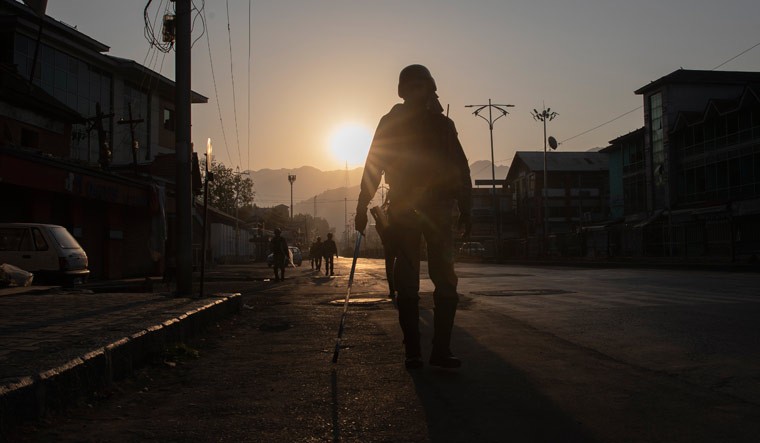Is Centre preparing to restore statehood to Jammu and Kashmir?
 Union minister Ramdas Athawale reiterated the government's commitment made during the abrogation of Article 370 to restore statehood of Jammu and Kashmir and conduct assembly elections | PTI
Union minister Ramdas Athawale reiterated the government's commitment made during the abrogation of Article 370 to restore statehood of Jammu and Kashmir and conduct assembly elections | PTI
Recent reports that the BJP-led government at the Centre is likely to restore statehood to Jammu and Kashmir has generated excitement among political parties and the people of the state. The buzz gained momentum after Chief Minister Omar Abdullah said he was ready to relinquish political power to bring back statehood.
Abdullah's statement was seen as a bold move to show that his party, National Conference, is focused on restoring full democratic rights to the region, rather than chasing power. However, observers believe that the road to restoring statehood is not so straightforward. They point out that many legislative, administrative and political factors suggest the Centre is not in a rush to change Jammu and Kashmir’s Union Territory status.
No clear sign from Parliament
To restore statehood, the government would need to pass a new bill in Parliament, similar to the Jammu and Kashmir Reorganisation Act, 2019. This bill would need to explain why the Centre now feels Jammu and Kashmir is ready to be governed as a state again. It would also need to show how the security situation has improved since Article 370 was removed and the region’s status was changed.
While the government frequently highlights improvements in law and order, increased tourism, and new infrastructure projects, recent terror attacks, inluding the one in Pahalgam, have raised concerns. If terrorism has not been eradicated and Operation Sindoor—which was initiated in response to the Pahalgam attack—has only been paused, how can the government claim that the security situation has improved in the former state, thereby justifying the restoration of statehood?
Secrecy around Kashmir policy
One reason for the confusion is the secrecy with which the Prime Minister’s Office (PMO) and the Ministry of Home Affairs handle Kashmir-related decisions. From the removal of Article 370 to other major changes, such moves have always come without warning. As of now, there is no reliable sign that a statehood bill is being prepared for the upcoming Monsoon Session of Parliament in August.
Amarnath Yatra and governor’s tenure
The ongoing Amarnath Yatra, which ends in August, is another reason why no big announcements are expected in the near term. Officials say the government is focused on ensuring the pilgrimage concludes safely. Meanwhile, the term of Lieutenant Governor Manoj Sinha is nearing its end, and a new advocate general’s appointment continues to hang fire, suggesting the current system is not being dismantled anytime soon.
Elections not a must
Reports said that statehood can only return after the assembly elections, but experts say this is not legally required. However, experts have opined that holding of fresh election to restore statehood was not a prerequisite. With Omar having expressed a willingness to leave power for the sake of statehood, the issue is unlikely to be a hindrance if the Centre decides to restore statehood.
Political risks for the BJP
Bringing back statehood at this stage could also be politically risky for the BJP, especially if it allows Omar or the National Conference to gain power again. If Omar returns as chief minister of a full-fledged state, the NC could regain the influence it had in the past. That’s a scenario the BJP might want to avoid, especially before the 2029 general elections.
While the BJP says its Kashmir policies are guided by the national interest, restoring statehood in a way that strengthens a rival party could be seen as a political setback, especially when the BJP is trying to grow its presence in the Valley.
The BJP leaders have hinted that statehood will be considered only after the next census and delimitation process is completed. This approach fits with the BJP’s larger political strategy, which aims to shape the region’s future electoral balance.
BJP’s ideological agenda
The BJP stated that the removal of Article 370 was essential to restore equal rights to all individuals living in Jammu and Kashmir, particularly West Pakistan refugees, Valmikis and Gurkas, who faced discrimination due to Article 370. However, the party has still not been able to ensure the return of migrant Kashmiri Pandits living in different parts of the country, a promise that remains unfulfilled to date. The settling of outsiders through changed domicile law is still a work in progress.
No decision yet
At present, the Centre has not given any clear sign that the process of restoring statehood has begun. While a surprise announcement cannot be ruled out entirely, it does not seem likely at this stage. For now, the government seems in no hurry to undo the changes made in August 2019. Observers argue that while the restoration of statehood is possible, given the political, administrative and legal issues, it is not probable.
India